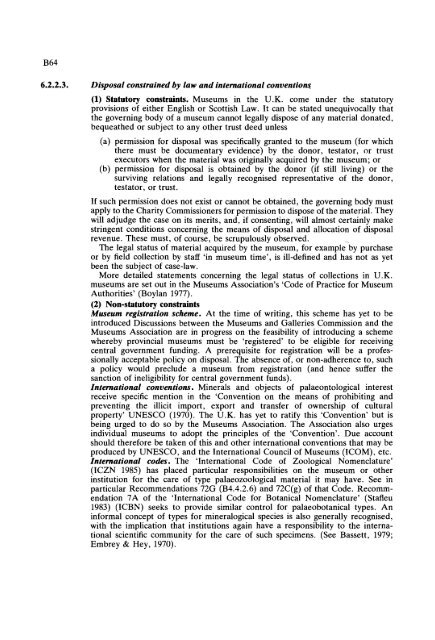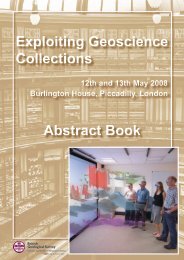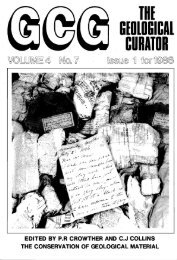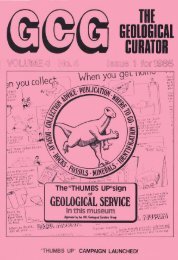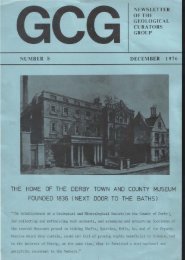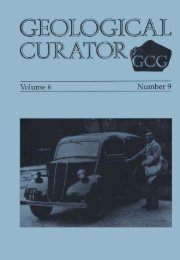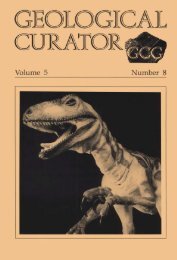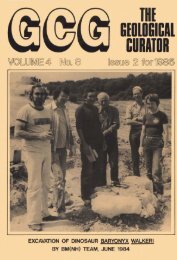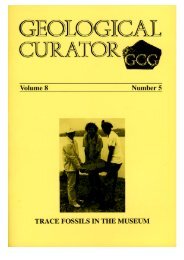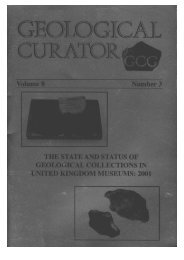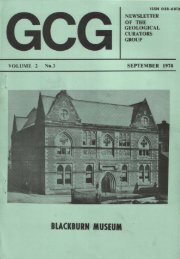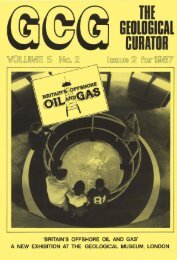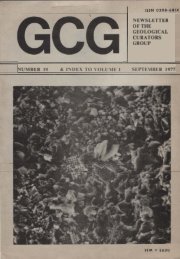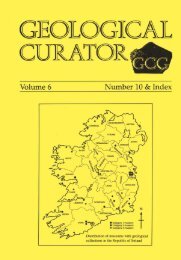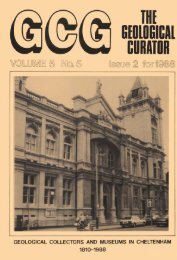GUIDELINES FOR THE CURATION OF GEOLOGICAL MATERIALS
GUIDELINES FOR THE CURATION OF GEOLOGICAL MATERIALS
GUIDELINES FOR THE CURATION OF GEOLOGICAL MATERIALS
Create successful ePaper yourself
Turn your PDF publications into a flip-book with our unique Google optimized e-Paper software.
6.2.2.3. Disposal constrained by law and international conventions<br />
(1) Statutory constraints. Museums in the U.K. come under the statutory<br />
provisions of either English or Scottish Law. It can be stated unequivocally that<br />
the governing body of a museum cannot legally dispose of any material donated,<br />
bequeathed or subject to any other trust deed unless<br />
(a) permission for disposal was specifically granted to the museum (for which<br />
there must be documentary evidence) by the donor, testator, or trust<br />
executors when the material was originally acquired by the museum; or<br />
(b) permission for disposal is obtained by the donor (if still living) or the<br />
surviving relations and legally recognised representative of the donor,<br />
testator, or trust.<br />
If such permission does not exist or cannot be obtained, the governing body must<br />
apply to the Charity Commissioners for permission to dispose of the material. They<br />
will adjudge the case on its merits, and, if consenting, will almost certainly make<br />
stringent conditions concerning the means of disposal and allocation of disposal<br />
revenue. These must, of course, be scrupulously observed.<br />
The legal status of material acquired by the museum, for examples'by purchase<br />
or by field collection by staff 'in museum time', is ill-defined and has not as yet<br />
been the subject of case-law.<br />
More detailed statements concerning the legal status of collections in U.K.<br />
museums are set out in the Museums Association's 'Code of Practice for Museum<br />
Authorities' (Boylan 1977).<br />
(2) Non-statutory constraints<br />
Museum registration scheme. At the time of writing, this scheme has yet to be<br />
introduced Discussions between the Museums and Galleries Commission and the<br />
Museums Association are in progress on the feasibility of introducing a scheme<br />
whereby provincial museums must be 'registered' to be eligible for receiving<br />
central government funding. A prerequisite for registration will be a professionally<br />
acceptable policy on disposal. The absence of, or non-adherence to, such<br />
a policy would preclude a museum from registration (and hence suffer the<br />
sanction of ineligibility for central government funds).<br />
International conventions. Minerals and objects of palaeontological interest<br />
receive specific mention in the 'Convention on the means of prohibiting and<br />
preventing the illicit import, export and transfer of ownership of cultural<br />
property' UNESCO (1970). The U.K. has yet to ratify this 'Convention' but is<br />
being urged to do so by the Museums Association. The Association also urges<br />
individual museums to adopt the principles of the 'Convention'. Due account<br />
should therefore be taken of this and other international conventions that may be<br />
produced by UNESCO, and the International Council of Museums (ICOM), etc.<br />
International codes. The 'International Code of Zoological Nomenclature'<br />
(ICZN 1985) has placed particular responsibilities on the museum or other<br />
institution for the care of type palaeozoological material it may have. See in<br />
particular Recommendations 72G (B4.4.2.6) and 72C(g) of that Code. Recommendation<br />
7A of the 'International Code for Botanical Nomenclature' (Stafleu<br />
1983) (ICBN) seeks to provide similar control for palaeobotanical types. An<br />
informal concept of types for mineralogical species is also generally recognised,<br />
with the implication that institutions again have a responsibility to the international<br />
scientific community for the care of such specimens. (See Bassett, 1979;<br />
Embrey & Hey, 1970).


